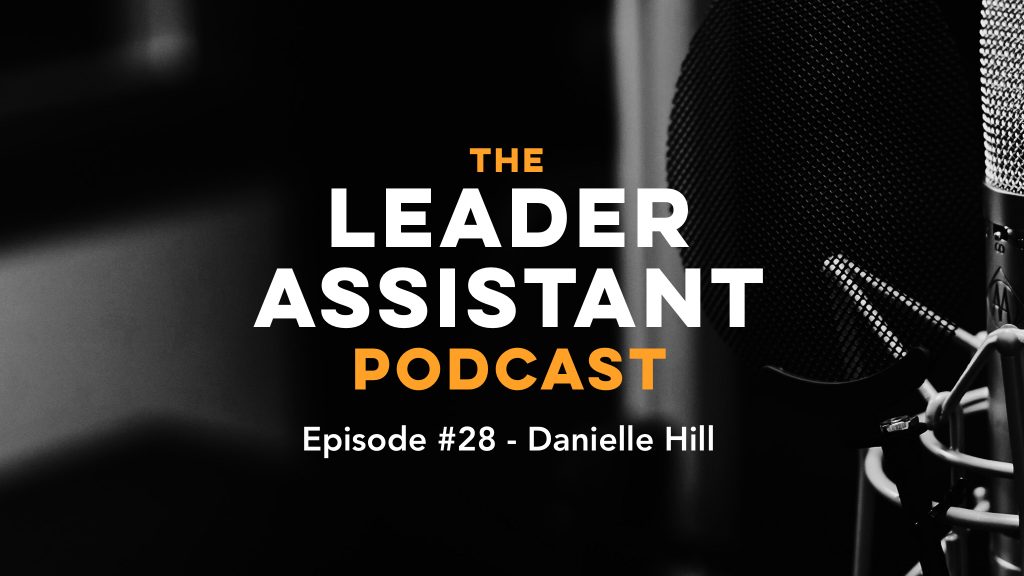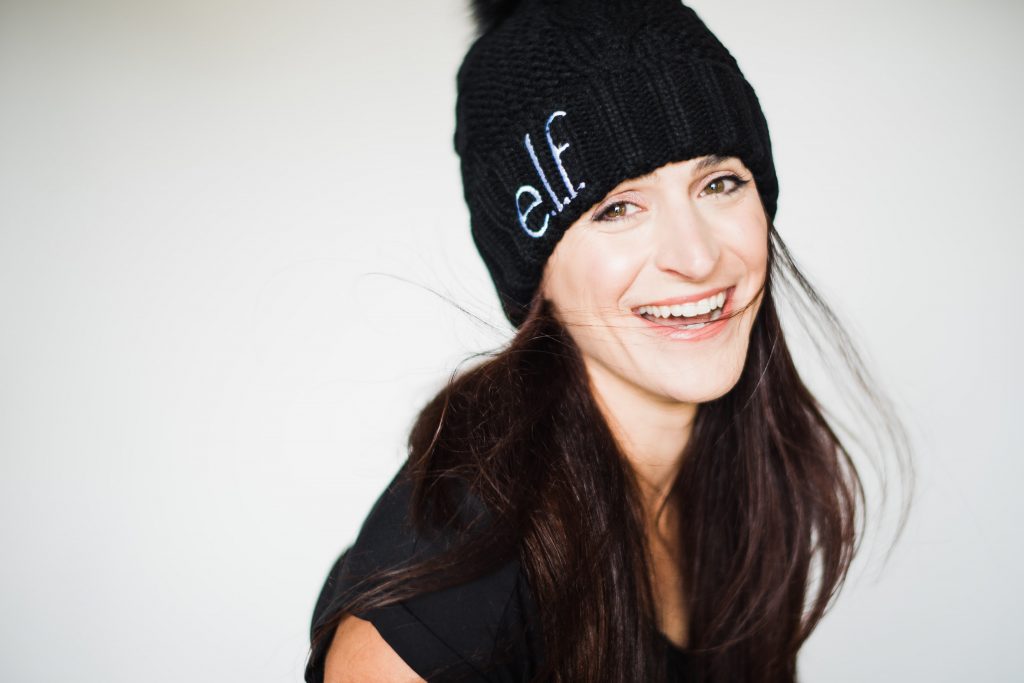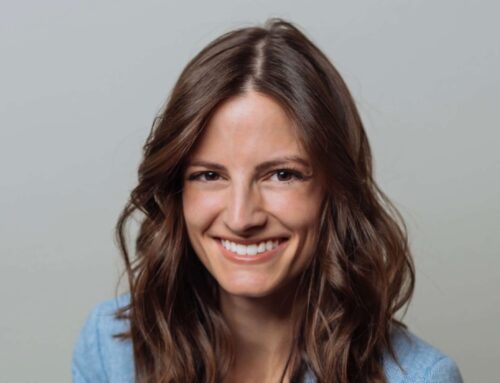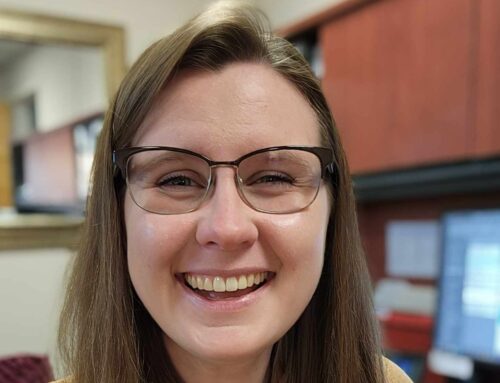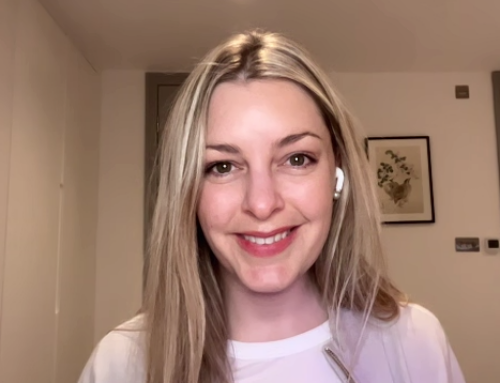In this episode, I chat with Danielle Hill, former EA to the CEO of e.l.f. Beauty, as well as former EA to one of the co-founders of Pandora.
Danielle and I talk about getting your seat at the table, handling conflict in the workplace, what executives can do to get more out of their assistants, and the importance of being proactive.
Danielle also shares her story of standing next to her CEO at the podium of the New York Stock Exchange when their company went public.
Enjoy our chat and please share this episode with your friends!
LEADERSHIP QUOTE
If you’re offered a seat on a rocket ship, don’t ask which seat. Just get on.
– Sheryl Sandberg
CONNECT WITH DANIELLE
About Danielle
As a Sr. Executive Assistant, Danielle Hill most recently partnered with the Chairman and CEO of e.l.f. Beauty, Tarang Amin.
Prior to e.l.f. Beauty, she supported Tarang at Schiff Nutrition, where they sold the company to Reckitt Benckiser.
Prior to that, she supported the COO of OnLive and co-founder of Pandora, Etienne Handman.
Danielle started her career in marketing, but quickly realized her strengths in planning and execution partnered well with executives at high growth companies.
She has been supporting c-suite executives for over 10 years.
SUBSCRIBE
Subscribe to The Leader Assistant Podcast so you don’t miss new episodes!
You can find the show on Apple Podcasts, Spotify, Google Podcasts, and Stitcher.
Join my email list here if you want to get an email when a new episode goes live.
JOIN THE COMMUNITY
Join the Leader Assistant Facebook Group here for bonus content and to network with other assistants who are committed to becoming leaders!
LEAVE A REVIEW
If you’re enjoying the podcast, please take 2 minutes to rate and review the show on Apple Podcasts here. Each review helps me stay motivated to keep the show going!
—
EPISODE TRANSCRIPT
Danielle Hill 0:00
Hi, I’m Danielle Hill. Today’s leadership quote comes from Sheryl Sandberg. If you’re offered a seat on a rocket ship, don’t ask Which seat just get on.
Podcast Intro 0:13
The Leader Assistant Podcast exists to encourage and challenge assistants to become irreplaceable, Game Changing leader assistants
Jeremy Burrows 0:24
Episode 28, party people. Hey, everyone, welcome to The Leader Assistant Podcast. I’m very excited to talk to Danielle Hill today. Danielle, thanks for joining me.
Danielle Hill 0:36
Yeah, thank you so much for having me. I’m thrilled to be here.
Jeremy Burrows 0:39
So I guess we connected on LinkedIn at some point. And then through Phoenix, Norman’s tribe, community, I can’t remember which one was first, you know, chicken and the egg kind of thing. So let’s go back in time a little bit. What was your very first job?
Danielle Hill 0:55
Oh, my very first job was actually working at a local dog kennel. So I love animals. I love dogs. And so when I think it was the day after I turned 16, I started working there, and work there on and off for eight years through high school and went back during the summer in college, because I just love animals so much.
Jeremy Burrows 1:21
Great. What did you learn from that job that you still use to this day,
Danielle Hill 1:26
dependability. That was where I really learned how important it was for me to be dependable to my employer. And, you know, I will never forget, I made the mistake of not asking for vacation when I needed it. And then the day before I was like, Oh, by the way, I’m going on vacation. And she was just, she was like, you know, she sat me down instead of firing me. She sat me down. And we talked about it. And she really talks about the importance of being dependable. And that just stuck with me, like all my career, I think she really helped shape me as an employee and really helped me learn at a young age. What a valuable tool that can be. And I’ll tell you, I was never even like a minute late, after all that happened. So she really taught me that. Yeah.
Jeremy Burrows 2:20
So when did you first become an EA? And why did you become an EA?
Danielle Hill 2:25
Yeah, I think it’s kind of funny, because I actually started my career in marketing, I have a degree in advertising from Chico State and California. And I was working as the Director of Marketing at a job at a contractor. And the CEO, I reported directly into the CEO. And the funny thing was, he saw something in me that I didn’t even realize yet. And it was just this inherent ability to get stuff done. So instead of me just focusing on marketing, he really wanted me to focus on so many different areas that he actually moved me into an EA role. And from there, I managed a fleet of 300 vehicles, I was in charge of our the construction of our 30,000 Square Foot Headquarters. I helped him start his winery. So I even went and became, I did Wine Tasting on weekends, I were started a little shop on weekends. So I’ve learned the business and helped him start his winery. I helped him build his museum car museum on his property, and really got to be involved in so many different areas of the business and help him grow the business and do so many things that I just fell in love with this role. And ever since then, I just I love it. And it really has given me insight into business in a way that I wouldn’t have expected. And so from there, it just kind of went on. And from there, I went into tech for a little bit and was the EAA to the CEO at OnLive, who was one of the founders at Pandora. And so yeah, just from there continued to grow and really learn what type of partnership I wanted. Being able to see the difference between, you know, an executive who kind of just kind of just wanted somebody that could get their tea in their coffee and schedule versus when I started working for Turing. I mean, who I is the exec that I most recently partnered with. He was really was a partnership he wanted someone who could help him be a better executive help the company grow and really add value in so many different ways. And that was the type of EAA that I wanted to be and where I was really able to learn and grow in so many ways that I would have never expected so probably a much longer answer than you expected. But But yeah, it’s been a fun journey for sure.
Jeremy Burrows 4:51
So do you have any crazy stories? It sounds like you know, winery, car museum and the front yard. What are some interesting crazy You know, PG 13 stories?
Danielle Hill 5:04
Yeah, um, I definitely have some crazy stories. All along. I think one that always sticks out in my head was it was the week before Christmas Eve. So a week before the holidays really kicked off and I got a call, I want 100 Carhartt jackets embroidered with our ranch logo, and I want them at the ranch by Christmas Eve. And I just thought, what. But in true fashion, and probably the reason I’m still doing this job is I said, okay, and I just pulled every string I could think of and was able to get my hands on the jackets was able to convince our local embroider who I love. And still to this day, I’m so thankful for him to work a couple extra hours so they could push the jackets through and I brought a bunch of stuff to the his office and just gave everyone gifts and was so thankful for them. And then threw him in the back of a truck and drove him up to the ranch and reading and yeah, so we got it done. But it was, you know, a little bit of a crazy story at least the time for me. And yeah, things from, you know, making deadlines work that you never expected to be able to make work all the way to, you know, going through an IPO and being you know, standing on the podium at the New York Stock Exchange, which is probably one of those things I will never forget and will for all, you know, always cherish so. So yeah, it’s it’s definitely across the board. There are a lot of stories.
Jeremy Burrows 6:46
Wow. So what was the stock exchange? Event? How was that? Like? Is it standard for the EAA to stand up there? Or how did that all come come to be?
Danielle Hill 7:01
I don’t know. Because I couldn’t tell you if other EAS have stood up there with their companies. But um, I think, you know, I was actually on maternity leave when my CEO decided they were ready to go public. And he called me and he said, Hey, so what do you think you ready to help us go public? And I was like, Yeah, I’ll be there tomorrow. And so we spent a year putting together the s one doing the management presentation, making all the right connections, dotting all the I’s and crossing the t’s. And when it came down to a, you know, the executive assistants role in that journey is so huge, you’re in charge of the road show your, you know, I was the one putting together the management deck. And I it’s funny, because when he when we were putting together the list for who’s going to stand on the podium, he’s like, why aren’t you going to be up there with me? And I was like, yeah, absolutely. I’d love to, you know, I was one of the four executives basically working on this project, working on us going public. And so it was such an incredible journey that I was so proud to be one of the people that he wanted up there with him.
Jeremy Burrows 8:15
That’s great. What’s the biggest mistake you made in your career as an associate? And what did you learn from it?
Danielle Hill 8:22
Um, oh, I think I’m constantly making mistakes and learning. You know, even down to things like when you go on the road with your executive, and they you’re at a big conference, and this was, you know, now, this was after we went public. So we were at a big investor conference. And the hotel is like a maze. And there’s room meeting rooms everywhere, and you have to get your executives to the right spot. And my mistake, I didn’t walk the floor before, it was pure chaos. And you couldn’t see any sign in the whole place, because it was all heads. And so here I am guiding to executives, and I have no clue where the room is that we’re going. Had I just walked the floor. Before getting there, I would have known exactly where to go, I would have learn the floor plan of the hotel. And it’s such a simple thing. But until you’re standing in that moment, thinking, Oh, what a huge mistake. I cannot believe my executives are counting on me to get them to the right place. And I don’t know where I’m going was just such an awful feeling. So I’ll tell you right now, I will never in my life. Not walk a floorplan. When I’m traveling with my executives, I need to know where the bathroom is what every room is called where that room is located. So I’ve never made that mistake again. But yeah, I mean, in the moment, they feel like such big Miss mistakes, but when you step back and you’re like, Hey, I’m so sorry. Here’s what I’m going to do next time to make sure this doesn’t happen again. You realize, like, at the end of the day, it’s all okay. But in the moment, gosh, they feel like big mistakes, don’t they? So? So yeah, I mean, there’s a million small ones like that. And, and yeah, you just kind of adjust and keep going. So. So yeah, even down to, you know, from numbers and board decks and making, you know, you’re doing last minute changes and fixing pages that you’re sliding into the binding because the number was wrong. So yeah, I mean, there’s definitely bigger mistakes that involve making sure as, as a public company, you’re not releasing the wrong numbers. But yeah, I think you’re constantly learning in this role. And that’s kind of what makes it so intriguing and fun.
Jeremy Burrows 10:45
So what’s something that you would tell an executive to help them work with their assistant better? Or to get more out of there, assistant?
Danielle Hill 10:56
Oh, that’s a great question. Um, I would say, really learn what your executive strengths are, what is it they’re really good at, and lean into that? Use them for the things that they really can, gosh, that they can just master? You know, I think a lot of times we executives, pigeon hole, executive assistants, and you know, you’re great at organizing, and that’s great. And you can, you know, you can conquer a calendar, no problem, but I bet they have a lot of other strengths that you’re not even utilizing. So really lean into that and figure out what those strengths are, are they creative? Are they, you know, great with Excel spreadsheets in project management? Are they, you know, there’s a million different ways that it could go, but what other ways can you really use your executive assistant that adds value to the company and leans into their strengths and helps them learn and grow? And not only their strengths, but the things that they’re interested in doing? So yeah, I mean, I think that that can be very powerful for an executive and their assistant to really have that open conversation of, here’s what I’m really good at doing. Let me let you know, let me get my hands on some of these things, and really show you what I’m able to do.
Jeremy Burrows 12:17
What if you’re having conflict with your executive, or even others in the office, for example, I talked to an assistant the other day that they said they had about, I don’t know, eight or nine admins or assistants in their kind of department. And two of them won’t talk to each other. And then those two don’t really talk to the others much or you know, it’s just kind of there’s a lot of tension. So, do you have any advice for dealing with conflict, whether it’s between your boss or other assistants or others in the office?
Danielle Hill 12:55
Yeah, I think so I took the TKI test, as part of we do a lot of high performance teamwork at our company, or at elf we did a lot of high performance teamwork. And as part of it, they wanted to really learn about people’s how they handle conflict, and I scored as an avoider. I avoid conflicts, well, in my role, you can’t avoid conflict do you have to be able to manage up and really having difficult conversations with your executive probably happened most days, or at least more days than not? And so I really had to find tools that helped me manage it in a way that didn’t make me fearful of the conversation. Oh, I need to go in and have this really, you know, tough talk with my boss, or, like you said, maybe there’s conflict within other between others in the company? How can I help, you know, encourage an environment that is open and conflict diverse and kind of fosters healthy conflict, because you do want some conflict, you want people to feel comfortable challenging each other. You don’t want it to be, oh, everybody’s nice to each other. We don’t really challenge how people are doing things because the company itself needs to continue to learn and grow. And unless you have some healthy conflict in your company, it that’s going to be really hard to do. So you want people to feel comfortable challenging each other. So I really kind of went out to find ways of how I could be more comfortable in having these difficult conversations. And a framework that really worked for me was super simple, but really thinking about inquiring first seeking to understand how the other person is feeling what they’re thinking how they’re viewing something just opened up so much to me, like by approaching conversations by inquiring first starting it by asking questions. I was able to go into a conversation much more calm. Kind of without this like fearful Oh, I have to go in and declare what I think, no, I was just approaching it as, Hey, I’d love to get your thoughts on how you thought, you know, so and so’s reaction was in the meeting? Or what did you think of the meeting? Or what did you think of the outcome? Or what would you have done differently? And just really start to ask people questions. And it’s funny, because if you ask questions, and they kind of start to warm up and open up and start to talk about their own feelings, and you’ll get so much information from them, and how they’re thinking about things, because we all come at different situations with a different background. So we perceive things differently. And a lot of times, it’s a miscommunication. Oh, she doesn’t like me for X and X reason. So I’m just not going to talk to her. Well, if you go and talk to her and say, hey, you know, I was just kind of wondering like, do you have like, Did I do something that upset you? Can we kind of just talk through, like, what might be going on? And I’m not using the exact right questions, because I’m talking to you now. But I think a lot of times, just by approaching a conversation with a question, you’re more comfortable going into the conversation, and you’re able to really understand the other person’s point of view. And if you really listen to that point of view, then you can come at it with more information, you can either change what you’re advocating for, or you can kind of be able to address their concerns, by you know, hey, I totally hear what you’re saying, Here’s kind of what I was thinking, let’s just talk through it. And so I think in a lot of ways, you either find out it was a complete misunderstanding, or you’re able to just sympathize with the person a little bit more, and maybe help them deal with a conflict that they’re dealing with on their end. And you can work through together versus it being one versus the other. Okay, that was super long winded. So I’ll pause for a
Jeremy Burrows 17:05
minute. No, that’s good. So, okay, those are good. That’s great advice, great tips, great, you know, practices. But what if somebody, you know, they have all that and they’re like, Alright, yes, I can do that, that’s great, I’m gonna go do that. But they get paralyzed by fear. And then they just, they just don’t have the confidence to take that, that action. So maybe they know what to do now. But they’re really struggling to get over the hump of taking the action and, and asking those questions and addressing those issues,
Danielle Hill 17:38
then I would recommend getting a kind of somewhat of a moderator somebody who can be in the room with you that maybe ask the questions, first, that you’re both comfortable with. We work with an HPT coach. And a lot of times, that’s what she does is she’s simply in the room to ask questions and get a conversation started. So hopefully, there’s someone either in your organization or just in your life in general, who can be that kind of kind of safe place that at least can create a safe environment for the two people. And hopefully, that company is very open to you know, I know, not everybody has coaches that they bring in, but really just who’s that person that you’re comfortable with, that you feel like could help moderate that situation for you.
Jeremy Burrows 18:34
Yeah, and I would say to that, the way that I would counsel somebody in that situation, if they don’t have somebody that’s a moderator or there, maybe their resources aren’t available to two big things I would say is one, you really just, you really just need to, you need practice. So maybe you can take a smaller bite sized conflict that you’re having with somebody else that maybe you’re in closer relationship with, or, you know, a family member or friend and kind of, you know, start small to, you know, Take a small bite and, and address something that way and kind of get your confidence that way. But I also would encourage, if there’s listeners out there that are really trying to deal with this conflict in with their boss or coworkers, I would just really encourage and remind you that your value as a human being is not dependent on how that conversation goes. And so, you know, it’s tough to remember that and there’s a lot of in some of these conversations, there might be a lot at stake. But if you go into it, just reminding yourself listen, if this if I totally bombed this and I totally say the wrong things or whatever. i Yes, there’s like I said, there could be some high stakes, you could lose your job. There could be some big things but you’re not a you’re not a less valuable person because of it no matter what happens.
Danielle Hill 19:58
Yeah, definitely. I think both of those are excellent. And a good reminder, I think, you know, it’s good to remind us that it’s okay to, to feel uncomfortable about this. It’s okay. Your feelings are completely normal. So yeah, I think I think that’s great advice.
Jeremy Burrows 20:19
You talked before about, and I’ve actually heard this kind of going around in the EA world is this idea of getting a seat at the table? I think you mentioned you had some interesting, a framework or, yeah, just a framework, I guess for tips on how to grab a seat at the table. If you’re an assistant, so kind of, can you just kind of quickly talk about what do you think it means to grab a seat or get a seat at the table? And then your thoughts on how to do that?
Danielle Hill 20:50
Yeah, so for me in my career, getting a seat at the table was really being part of our executive team, and not as the person who attends meetings and takes notes and reports back then action items, but as a card carrying member as somebody who was responsible for contributing, you know, really being a part of the executive team. You know, I actually sat down with my executive and we kind of brainstormed, like, how did I get here? How did we really get to this point, have you seen the value in my role, and the value in me to make put me on your executive team. And so what we kind of found was, it was this, you know, my story kind of happened in this specific order. But I think all of these things can happen on their own time and kind of however works, it works for each individual. But for me, it really started with identifying my strengths, kind of what I mentioned before, and, and again, this wasn’t, this was outside of the core, I think, once you’ve mastered the core of the job, you you know, your calendaring wizard, you can book travel in your sleep, you know how to get that restaurant reservation that nobody else else can get? Once you’ve mastered that, you’ve really built an enormous amount of trust with your executive. So from there, where can you identify your strengths and really lean into other opportunities to add value to your company? For me, it was that I was a creative, but I wasn’t a graphic designer. In fact, I tried and failed twice. And that’s a completely different story. But But yeah, and but I had this ability to visually communicate a message. So whether that was our growth strategy, whether it was management presentations, whatever it was that I was communicating, either throughout the company, internally, externally, whatever it might be, I was really good at telling a story visually. And so we’ve just really leaned into that. And at the same time, I wanted to get involved in areas of the business that were super interesting to me. So I had always been intrigued by mortgage mergers and acquisitions. And so when we were at shift nutrition, and we were looking to acquire airborne, I wanted to be involved, I didn’t care what I was doing, I was going to raise my hand for it. So yeah, you want me to track 150, you know, documents that crosses data portal and see who has questions and who needs follow up and all of the above? And, yeah, I’ll do that. So it was really about kind of identifying the strengths that I had getting involved in the areas of the business that were really interesting to me. And what happened was the two merged. So then when it came time for us to sell shift nutrition, a public company, so highly confidential. There were only four of us in the company that knew about this potential acquisition. And they brought me in, but it wasn’t just a schedule, they could have done that without bringing me under the tent, it was to help tell her story. So now I’m merging in my strengths with the things that are really interesting to me. And from there, it seemed like things kind of just took off and I learned a ton. I got to be involved in a huge X acquisition with a 6x shareholder return. And then when I was brought on when terrain was brought on as CEO of elf, he asked me to come with him. And that was when he put me on his executive team. And so I think all of these things really built up to getting that seat at the table. But one other key area was that I really worked hard at earning the respect of my a team. And when I talk about an A team, it wasn’t the other executives or administrators in the office, they’re actually my lifeline. I couldn’t do my job without them. But my A team were the the other direct reports to my executives. So SVP C suite executives are my peers, they’re my team. And so earning their respect and them seeing me as a peer and not as the assistant, but really somebody who they could go to for advice, somebody that they could talk through things with, that they saw value in, so that when I got the seat at the table, they embraced it. And they brought me in with them. And I was fortunate that a lot of the team from Schiff was also the team that came with us to elf. So I had already built that respect. But that was a huge part of it as well. When I walked in and sat at that table, as part of the team, as a card carrying member, the team around me knew what I was capable in the value that I brought, and therefore embraced it wholly and really made me part of the team.
Jeremy Burrows 26:03
If you’re an executive listening to this podcast, and you’re thinking, I want to hire Danielle, or so or someone similar, what do you think executives should look for in an assistant? And how should they maybe interview to get somebody like you, if they’re, if they’re listening to this? And they’re thinking, Man, I don’t want somebody like that?
Danielle Hill 26:26
Um, I would say, look for somebody that really has a heart for the role, I think, you know, I think it matters, I think that somebody who wants this role to be seen as a true partnership as not as a tool necessarily for them to get somewhere else, but how, how can we continue to elevate the EA role into what it truly is, and that is a partner and somebody who adds a ton of value at a company and to an executive? So this is a great question. When interviewing EAS, I would say, look for somebody who has heart, look for somebody who’s super energetic about the role, and look for somebody who wants to take on kind of anything they can to make your life easier to add value to the company to help the company grow and seize that big picture. That’s a harder question. I was expecting. But yeah, I mean, I think all of those things, you know, and as the EA coming into interviewing for a role, you know, really ask about who that executive has had in the past? Is there EA? And what was it about that EA that they truly valued, because I think a lot of times, that also shows a lot about who the executive is, and what type of, you know, role they’re trying to fill, or what they really see as the value that an EA can bring to the table. So it’s kind of a hard role to interview for. And a lot of times it has to come down to kind of that gut feel of who who, you know, who’s really the perfect fit for me or the right fit for me. So,
Jeremy Burrows 28:32
yeah, it’s definitely not an easy, easy question to answer. No, you know, it’s hard, because in my experience, it’s like, okay, well, I got hired in my current job, because my current executive has known me for a while, never worked with me, but known me for a while. So kind of knew, you know, knew enough about me to know that I, you know, wasn’t a flake. And then he also knew my prior executive. And so he kind of knew what I had to deal with. And so, and he’s like, if, you know, basically, if you can handle that, then you can handle me. And so there’s, you don’t always have that connection. You don’t always have that context, when you’re looking for people. And that’s why I think the first place you should always look for people is your network. Because if you if you know, somebody you trust, and you know, kind of the work scenario they’re in, then the recommendation is probably going to be your, your best bet in a lot of cases.
Danielle Hill 29:36
Oh, definitely. If you Yeah, if you have a good strong reference of somebody who says, yeah, that person is a rock star. That yeah, can just save so much time for sure.
Jeremy Burrows 29:50
What is one productivity hack, or tip that you want to share that you just saw? You can’t live without
Danielle Hill 30:01
productivity hack, I would say, Time blockings probably the biggest productivity hack. But one that I think is been kind of my tool is, I feel like a lot of times you have your inbox and some to do list that somewhere else, and maybe some other lists that are located across multiple different places. And one thing I did to really just narrow down, my focus is, all of that, for me is in one place. And so when I am this, I’m sure doesn’t work for everybody. But for me, my to do list is my inbox and when the number of emails that are sitting there, because is the amount is the number of things I need to get done. So I email myself, hey, you need to do this, you need to do this. And that’s actually my to do list. And then my focus is all in one place. And I’m working through the same list if you if, for me, it just helps to not have things in different places, if I can have everything located in one spot, I was much more efficient than trying to bounce between email and a to do list and all of that. So anyways, that was a big kind of change that I made that really helped me just stay focused and productive. And then when I turn that off, because I do time blocks to work on different projects, again, my focus is, is in one place versus being pulled in so many different directions, which happens really easily in our role.
Jeremy Burrows 31:42
Yeah, I love it. That’s that’s what I’ve been doing for years at my inbox. And then I have a simple like to call on Google spreadsheet that I use for kind of sitting down with my executive and walking through kind of rapid fire to knock out stuff. But yeah, most most of the time, I’m just living in my inbox, and I email myself and yeah, I love just the simplicity of it. A, you know, all these nice fancy to do task project management software’s. Yeah, I always I always think those are just setting those up is for a lot of people, it’s an excuse to feel like they’re accomplishing something, because they set up this tool, when the reality is a lot of times, we just need to sit down and get our stuff down. So what are you grateful for?
Danielle Hill 32:32
I’m grateful for a lot of things. I’m grateful for a family that supports my career. I’m, you know, I will always be career focused. And I will always want to continue to push every angle that I can. And I’m very fortunate to have a family that is supportive of that and empowering for me to be able to go, you know, really do that I I am grateful to have worked for somebody who helped me identify my strengths and see the potential in this role. And, you know, I think terrain has just given me so many opportunities to learn and grow that I will always be grateful for that. And the list can go on and on. But I’ll kind of leave it at those two.
Jeremy Burrows 33:27
That’s awesome. What’s one book or resource that you would recommend all assistants check out? Oh,
Danielle Hill 33:34
book or resource? Why just got the founder and the force multiplier. So I have to read that one.
Jeremy Burrows 33:45
I just interviewed Hallie. So we’ll Oh, you did? Great. Glad you didn’t read it and had a have a lot of negative things to say?
Danielle Hill 33:55
No, I’m super excited to read it. I don’t know if I have one specifically because I think different things work for different people. But I would just encourage everyone to continue to read. And you know, I actually one year asked for a subscription to the Harvard Business Review because I as my Christmas gift for my executive because I wanted to continue to read and learn and just know as much as I can to be, you know, be able to support my executive better. You know, I think that just that, that conscious effort to continue to, you know, read different things, I think is great. So yeah, I apologize, I don’t have something off the top of my head.
Jeremy Burrows 34:47
But I mean, that’s even even that’s just a great tip. You know, Hey, your company can pay for a subscription to The Wall Street Journal or New York Times or Harvard Business Review. You know, whatever it is or a book couple books, there’s, you know, there’s no subscription book services where you can get like leadership books mailed to you every month. And, you know, why not ask your company to pay for that for your development? Yeah, I like the Harvard Business Review idea. I tried to read a variety of things. But then I also tried to read whatever my executive is reading. I just like to follow the same articles, or if I noticed that he’s, you know, saved an article or something, I like to go read it so that I’m kind of in his head a little bit better.
Danielle Hill 35:33
Yeah, definitely. You know, especially when it comes to culture and things like that. If you’re, you know, both reading, and now I’m going blank on the name of the book. But um, but yeah, if you’re both reading the same book on culture, then you can have a deep conversation about the company. And if the culture there is what you really intended it to be in all of those things. So. So yeah, I think that’s huge. That’s great advice, read the same thing that your executive is reading and recommend books for him or her as well. Yeah.
Jeremy Burrows 36:06
So if you could snap your fingers and instantly give all assistance, more of something, what would it be?
Danielle Hill 36:15
I would give everybody more confidence, more confidence to just go out there and be your amazing self and get the you know, raise that you deserve and not be afraid to have that conversation and really just be able to talk to other executives in your company as a peer. I would love to give everybody more confidence because I think the more we show up as confident contributors to our company, the more our position just continues to elevate.
Jeremy Burrows 36:52
Love it. Perfect way to end the episode. Well, thanks so much, Danielle, for for joining me and sharing your little bit of your story and a little bit of your advice. From your experience. You’ve sounds like you’ve had an amazing career and exciting future ahead of you.
Danielle Hill 37:10
Thank you. Thank you so much for having me, Jeremy. And for doing everything that you’re doing this podcast is incredible. You’re doing such a good job. Yeah, I’m so proud to be here and that you even asked me to so thank you.
Jeremy Burrows 37:24
Yeah, you’re welcome. Is there any thing that my listeners can support? What you’re doing or find is there somewhere they can find you online?
Danielle Hill 37:34
Um, right now I’m, I focused a lot of my energy on LinkedIn. So yeah, LinkedIn. But stay tuned. You never know what’s to come next. Yeah,
Jeremy Burrows 37:48
sounds good. Well, I’ll put all the link your LinkedIn link and anything else you’d might come up with? I can put it in the show notes for people to check out.
Danielle Hill 37:56
Sounds great. Thank you so much.
Jeremy Burrows 37:59
Thanks so much. And thank you for listening. Check out the show notes at leaderassistant.com/28 And be sure to check out my online courses at Goburroughs.com/courses Until next time, have a great day.
Podcast Outro 38:25
Help my dad out and leave a review on iTunes. Goburroughs.com

